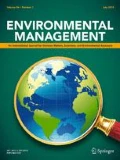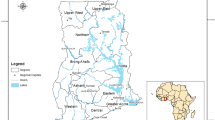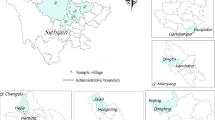Abstract
Trust in natural resource managers and planners is recognized as a crucial component of the public’s perception of environmental risks, including the risk of consuming water in cities. Although China is famous for its dubious water quality, public perception of the performance of water suppliers in China has scarcely been considered. Yet this is important, not least because improvements in urban water quality are most likely if the public perceives that there is a risk, which is a function of their levels of trust. We, therefore, examine the Shanghai public’s trust in urban water authorities through analysis of the results from a face-to-face questionnaire that 5007 residents responded to. We find that although respondents show a moderate level of overall trust in water suppliers, they have less trust in the honesty and fairness of these organizations. In addition, we find that hukou status and education help explain the differences in people’s trust in Shanghai’s water authorities, and that these are more influential than factors such as gender and age. For water managers in Shanghai, this implies trust can be improved through a greater effort at public relations and increased transparency about decision making and levels of pollution.


Similar content being viewed by others
References
Abrajano MA, Alvarez RM (2010) Assessing the causes and effects of political trust among U.S. Latinos. Am Polit Res 38(1):110–141
Agger RE, Goldstein MN, Pearl SA (1961) Political cynicism: measurement and meaning. J Polit 23(03):477–506
Allik J, Realo A (2004) Individualism-collectivism and social capital. J Cross-Cult Psychol 35(1):29–49
Anderson N (2010) The public trust and air quality. In: Proceedings of the Annual International Conference on Soils, Sediments, Water and Energy, vol 13. Amherst, Massachusetts, p 16
André S (2014) Does trust mean the same for migrants and natives? Testing measurement models of political trust with multi-group confirmatory factor analysis. Soc Indic Res 115(3):963–982
Bryman A (2015) Social research methods. Oxford university press, Oxford, UK
Careja R, Emmenegger P (2012) Making democratic citizens: the effects of migration experience on political attitudes in Central and Eastern Europe. Comp Polit Stud 45(7):875–902
Catterberg G, Moreno A (2006) The individual bases of political trust: Trends in new and established democracies. Int J Public Opin Res 18(1):31–48
Chan KW (2009) The Chinese hukou system at 50. Eurasia Geogr Econ 50(2):197–221
Chan KW, Zhang L (1999) The hukou system and rural-urban migration in China: Processes and changes. China Q 160:818–855
Chen J (2004) Popular political support in urban China. Woodrow Wilson Center Press, Washington, D.C
Chen X, Shi T (2001) Media effects on political confidence and trust in the People’s Republic of China in the post-tiananmen period. East Asia 19(3):84–118
Cheng T, Selden M (1994) The origins and social consequences of China’s hukou system. China Q 139:644–668
China Statistical Yearbooks (2015) National data, National Bureau of Statistics of China 2015. http://data.stats.gov.cn/search.htm?s=%E4%B8%8A%E6%B5%B7%20GDP (last accessed 29 Jun 2017)
Christensen T, Lægreid P (2005) Trust in government: The relative importance of service satisfaction, political factors, and demography. Public Perform Manag Rev 28(4):487–511
Converse PE (1972) Change in the American electorate. In: Campbell A, Converse PE (eds) The Human Meaning of Social Change. New York Russell Sage Foundation, pp 263–337
Cosier M, Shen D (2009) Urban water management in China. Water Resour Dev 25(2):249–268
Das TK, Teng B-S (2004) The risk-based view of trust: a conceptual framework. J Bus Psychol 19(1):85–116
de Vroome T, Hooghe M, Marien S (2013) The origins of generalized and political trust among immigrant minorities and the majority population in the Netherlands. Eur Sociol Rev 29(6):1336–1350
Diep F (2013) 16,000 Dead pigs in the Huangpu: Can you still drink Shanghai’s water? Australian Popular Science. http://www.popsci.com.au/science/16000-dead-pigs-in-the-huangpu-can-you-still-drink-shanghais-water,379259 (last accessed 31 Oct 2017)
Feng HN (2014) Question about the “incompetent” of water quality testing. 对水质检测“无能”的追问. J Sel Artic (first half Version) 6:61
Feng W, Zuo X, Ruan D (2006) Rural migrants in Shanghai: living under the shadow of socialism. Int Migr Rev 36(2):520–545
Fisher J, Van Heerde J, Tucker A (2010) Does one trust judgement fit all? Linking theory and empirics. Br J Polit Int Relat 12(2):161–188
Fragkou MC, McEvoy J (2016) Trust matters: why augmenting water supplies via desalination may not overcome perceptual water scarcity. Desalination 397:1–8
Gao X, Zhai X (2013) A comparative study on trust in government between urban and rural residents. Sociological Studies 2:1–27 (in Chinese) Besides, the Chinese title of this paper is 政府信任的城乡比较 zhengfu xinren de chengxiang bijiao
Gill B (1999) Limited engagement. Foreign Aff 78(4):65–76
Hakhverdian A, Mayne Q (2012) Institutional trust, education, and corruption: A micro-macro interactive approach. J Polit 74(03):739–750
He G, Mol AP, Zhang L, Lu Y (2014) Nuclear power in China after Fukushima: understanding public knowledge, attitudes, and trust. J Risk Res 17(4):435–451
Hetherington M (1998) The political relevance of political trust. Am Polit Sci Rev 92(4):791–808
Hu R (2007) Farmers’ petition and erosion of political trust in government. Sociol Stud 3:39–55. (in Chinese)
Hupcey JE, Penrod J, Morse JM, Mitcham C (2001) An exploration and advancement of the concept of trust. J Adv Nurs 36(2):282–293
Leahy JE, Anderson DH (2008) Trust factors in community–water resource management agency relationships. Landsc Urban Plan 87(2):100–107
Levi M, Stoker L (2000) Political trust and trustworthiness. Annu Rev Polit Sci 3(1):475–507
Li L (2013) The magnitude and resilience of trust in the Center: evidence from interviews with petitioners in Beijing and a local survey in rural China. Mod China 39(1):3–36
Li L, Li SM, Chen Y (2010) Better city, better life, but for whom?: the hukou and resident card system and the consequential citizenship stratification in Shanghai. City, Cult Soc 1(3):145–154
Ljunge M (2014) Social capital and political institutions: evidence that democracy fosters trust. Econ Lett 122(1):44–49
Mangum M (2011) Explaining political trust among African Americans: examining demographic, media, and social capital and social networks effects. Soc Sci J 48(4):589–596
Marien S (2017) The measurement equivalence of political trust. In: Zmerli S and van der Meer TWG (eds) Handbook on political trust. Edward Elgar Publishing, p 89–103
Maxwell R (2010) Evaluating migrant integration: Political attitudes across generations in Europe. Int Migr Rev 44(1):25–52
McDermott CL (2012) Trust, legitimacy and power in forest certification: a case study of the FSC in British Columbia. Geoforum 43(3):634–644
Metlay D (1999) Institutional trust and confidence: A journey into a conceptual quagmire. In: Cvetkovich G, Löfstedt R (eds) Social trust and the management of risk. Earthscan, London, pp 100–116
Miller AH, Listhaug O (1990) Political parties and confidence in government: A comparison of Norway, Sweden and the United States. Br J Polit Sci 20(3):357–386
Mishra AK (1996) Organizational responses to crisis: The centrality of trust. In: Kramer RM, Tyler TR (eds) Trust in organizations: Frontiers of theory and research. Sage, Thousand Oaks, CA, pp 261–287
Moy P, Scheufele DA (2000) Media effects on political and social trust. J Mass Commun Q 77(4):744–759
Newton K (2001) Trust, social capital, civil society, and democracy. Int Polit Sci Rev 22(2):201–214
Nunkoo R (2015) Tourism development and trust in local government. Tour Manag 46:623–634
Poortinga W, Pidgeon NF (2003) Exploring the dimensionality of trust in risk regulation. Risk Anal 23(5):961–972
Qin B, Zhu G, Gao G, Zhang Y, Li W, Paerl HW, Carmichael WW (2010) A drinking water crisis in Lake Taihu, China: linkage to climatic variability and lake management. Environ Manag 45(1):105–112
Qiu H, Huang J, Pray C, Rozelle S (2012) Consumers’ trust in government and their attitudes towards genetically modified food: empirical evidence from China. J Chin Econ Bus Stud 10(1):67–87
Qiu J (2011) China to spend billions cleaning up groundwater. Science 334(6057):745–745
Ross VL, Fielding KS, Louis WR (2014) Social trust, risk perceptions and public acceptance of recycled water: Testing a social-psychological model. J Environ Manag 137C:61–68
Röder A, Mühlau P (2012) Low expectations or different evaluations: What explains immigrants’ high levels of trust in host-country institutions? J Ethn Migr Stud 38(5):777–792
Serritzlew S, Svendsen GT (2011) Does education produce tough lovers? Trust and bureaucrats. J Comp Policy Anal: Res Pract 13(1):91–104
Shanghai Statistical Yearbook (2016) Shanghai Municipal Bureau of Statistics. http://www.stats-sh.gov.cn/tjnj/nj16.htm?d1=2016tjnj/C0201.htm (last accessed 29 Jun 2017)
Shen F, Guo ZS (2013) The last refuge of media persuasion: news use, national pride and political trust in China. Asian J Commun 23(2):135–151
Shi T (2001) Cultural values and political trust: a comparison of the People’s Republic of China and Taiwan. Comp Polit 33:401–419
Siegrist M, Cvetkovich G (2000) Perception of hazards: the role of social trust and knowledge. Risk Anal 20(5):713–719
Sztompka P (1999) Trust: A sociological theory. Cambridge University Press, Cambridge
Sun I, Hu R, Wu Y (2012) Social capital, political participation, and trust in the police in urban China. Aust NZ J Criminol 45(1):87–105
Tait M (2012) Building trust in planning professionals: understanding the contested legitimacy of a planning decision. Town Plan Rev 83(5):597–618
Tan SJ, Tambyah SK (2011) Generalized trust and trust in institutions in Confucian Asia. Soc Indic Res 103(3):357–377
Tani M (2017) Hukou changes and subjective well-being in China. Soc Indic Res 132(1): 47–61
Tao T, Xin K (2014) Public health: a sustainable plan for China’s drinking water. Nature 511(7511):527–528
The Economist (2013) Water in China - Desperate measures - Rivers are disappearing in China. Building canals is not the solution - http://www.economist.com/news/leaders/21587789-desperate-measures?fsrc=nlw#sthash.d6Df0hTs.dpbs (last accessed 31 Oct 2017)
Trettin L, Musham C (2000) Is trust a realistic goal of environmental risk communication? Environ Behav 32(3):410–426
Tsang S, Burnett M, Hills P, Welford R (2009) Trust, public participation and environmental governance in Hong Kong. Environ Policy Gov 19(2):99–114
Wals SC (2010) Does what happens in Los Mochis stay in Los Mochis? Explaining postmigration political behavior. Polit Res Q 64(3):600–611
Wang Z (2005) Before the emergence of critical citizens: Economic development and political trust in China. Int Rev Sociol 15(1):155–171
Wang Z (2007) Public support for democracy in China. J Contemp China 16(53):561–579
Wang Z (2010) Generational shift and its impacts on regime legitimacy in China. The University of Nottingham & China Policy Institute, University of Nottingham, UK
Webber MJ, Wang M, Ying Z (eds.) (2002) China’s transition to a global economy. Palgrave Macmillan, Hampshire
Wong TK-y, Wan P-s, Hsiao H-HM (2011) The bases of political trust in six Asian societies: Institutional and cultural explanations compared. Int Polit Sci Rev 32(3):263–281
Wu Y, Sun IY (2009) Citizen trust in police: the case of China. Police Q 12(2):170–191
Xinhua News Agency (2012) Xinhua Insight: China never to copy Western political system - Xinhua| English.news.cn. http://english.cntv.cn/20121112/107203.shtml (last accessed 31 Oct 2017)
Yang DL (2004) Remaking the Chinese leviathan: Market transition and the politics of governance in China. Stanford University Press, Stanford, CA
Zhao D (2009) The mandate of heaven and performance legitimation in historical and contemporary China. Am Behav Sci 53(3):416–433
Zhen N (2017). Political trust in China: evidence from water consumption in Shanghai. Dissertation (Ph.D), The University of Melbourne
Zhou C, Gao NY, Zhao SJ, Chu WH (2012) Evaluation of water quality in Qingcaosha Reservoir of Shanghai. J Tongji Univ (Nat Sci) 40(6):894–899. (in Chinese)
Acknowledgements
This research was supported by the Australian Research Council Discovery Project DP110103381. The Albert Shimmins Fund is acknowledged for providing a Writing-up Scholarship to support the writing of this article.
Author information
Authors and Affiliations
Corresponding author
Ethics declarations
Conflict of Interest
The authors declare that they have no competing interests.
Appendix 1 Sampling procedure
Appendix 1 Sampling procedure
Districts | The category of district and location | Resident population 2009 (Million) | Percentage of whole population | Reference sample size |
|---|---|---|---|---|
Whole city | — | 19.2132 | 100 | 5000 |
Pudong New | New district | 4.1905 | 22 | 1091 |
Huangpu | Central city | 0.5320 | 3 | 138 |
Luwana | Central city | 0.2694 | 1 | 70 |
Xuhui | Central city | 0.9627 | 5 | 251 |
Changning | Central city | 0.6440 | 3 | 168 |
Jing’an | Central city | 0.2484 | 1 | 65 |
Putuo | Central city | 1.1359 | 6 | 296 |
Zhabei | Central city | 0.7603 | 4 | 198 |
Hongkou | Central city | 0.7708 | 4 | 201 |
Yangpu | Central city | 1.2062 | 6 | 314 |
Minhang | Suburb | 1.8143 | 9 | 472 |
Baoshan | Suburb | 1.3655 | 7 | 355 |
Jiading | Suburb | 1.1054 | 6 | 288 |
Jinshan | Suburb | 0.6910 | 4 | 180 |
Songjiang | Suburb | 1.1899 | 6 | 310 |
Qingpu | Suburb | 0.8155 | 4 | 212 |
Fengxian | Suburb | 0.8190 | 4 | 213 |
Chongming Countyb | Suburb County | 0.6924 | 4 | 180 |
Rights and permissions
About this article
Cite this article
Zhen, N., Barnett, J. & Webber, M. The Dynamics of Trust in the Shanghai Water Supply Regime. Environmental Management 61, 224–235 (2018). https://doi.org/10.1007/s00267-017-0974-5
Received:
Accepted:
Published:
Issue Date:
DOI: https://doi.org/10.1007/s00267-017-0974-5




